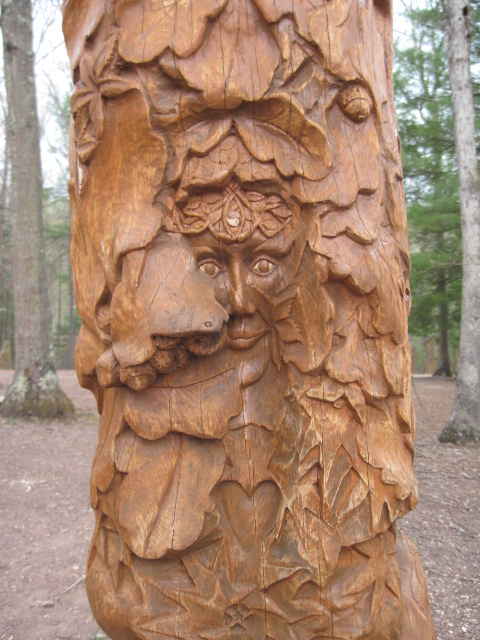
New moons for old …
You can find any number of blogs that offer you a Druid or general Pagan what: what to do on Lunasa, what to include in a ritual for the full moon, what herbs can help with skin conditions, what to say to family members uncertain or fearful of your non-mainstream interests and practices, what medieval manuscripts tell us about older beliefs and practices, what a recently-published author gets wrong or right, what the presumed origins are for X, Y or Z. Regular readers here know I’ve written a fair number of posts like that myself. Yet I suspect the reason you visit this blog, or keep coming back, is not to track down a reliable source of practical what — others do that better and more regularly — but to see what this crazy old Druid is on about now. Maybe something here will be peculiarly useful this time …
With luck and persistence and the blessings of earth, sea and sky (and in many cases, a band of inward mentors that keep tabs on us in spite of our best efforts to ignore or discount them), you keep practicing and reading and dreaming till you learn how to suss out the kind of what you’re looking for. Through regular practice, you learn that practice itself will guide you to more of your own what, because it hones your inner senses, it magnetizes your inner compass, it locks-and-loads your crap-detector, it re-enchants the mundane taking out the trash and sweeping the floors. You’re doing magic, whether you know it or not, because magic is what humans do. You learn to sort wheat from chaff, gold from garbage. You gain inner confidence. You are, in sum, guided to what works for you. “The purpose of magical arts is to enable the changes within the individual by which he or she may apprehend these further methods inwardly” (1), notes musician and mage R. J. Stewart.
And a special blessing on those of you who do persist, who recognize firsthand the challenges of practice, but who manage to move beyond the “eternal beginner” stage, who do the work, who aspire to wisdom yourselves, to trust your own inner guidance and not always expect someone else to tell you what to do. Your struggle is itself service. Our world needs more Wise Ones like you, today more than yesterday, and tomorrow even more than today. You help hold the soil against the inevitable storms, so there’s something left to plant in, next season, so the next generation can not merely scrounge to survive, but can feast.
Anyone who reads — and even more, follows — this blog knows that the why and the how interest me at least as much as the what, and often far more. Or if you want to think of these as just another kind of what, then it’s the what that lies underneath and behind all the whats of practice. Because if you practice for any length of time, the experience of a practice starts to run thin and turn hollow, if you don’t have things of spiritual substance underlying it.

Pillar at Four Quarters Sanctuary, Artemas, PA, U.S.A.
So when I read R. J. Stewart’s assertion that “it is not the ritual that confers initiation, but initiation that generates the ritual” (2), I sit up and pay attention. We’ve all had the experience of the “right book at the right time”, or its equivalent — of situations, “chance” encounters, circumstances lining up and smoothly ushering us to growth, change, transformation, love, opportunity. That inner sensibility of ours, sharpened by practice, resonates with what the eyes or ears take in, and we find a new direction, an opening, a doorway.
If we’re alive at all, if we haven’t given up on our own lives as sources of renewal and creativity and possibility, if we still draw on the well-springs of this incarnation, we come to count on initiations. Anyone alive today has been through one already by being born, and most of us have been through several. We may still be sorting out the immediate consequences and long-term effects of ones we’ve passed or are now passing through, and though we may not always welcome the more challenging ones at first, we may well gain perspective that brings us to a point where we can view them as “difficult gifts”. A diagnosis of cancer, as a common example, though it brings suffering and fear and inevitable change, and sometimes a shorter life, can grow our compassion and bring us priceless experiences we would not know in any other way. Equal parts “gift” and “difficult”.
But what of the easier gifts, the initiations that don’t have to devastate us, that don’t drop us squarely into a Dark Night, or shred much of our lives just to get us to look at and live things differently? After all, love and joy, a new friendship, the birth of a child or grandchild, a fulfilling job, a true gift received, a profound insight unfolding, a period of intense creativity — these are initiations, because we’re not the same afterwards. “Initiation emphatically does not consist of powers mysteriously conferred on us during vague quasi-religious ceremonies” (3) — in spite of what New Age gurus suggest.
The what that I’m looking for here are practices that make initiations easier. Let’s look at an obvious big one: I’m going to die, so how can I make that transition smoother? Yes, another art we’ve lost: ars moriendi, the art of dying, was a serious study and practice, not so many centuries ago. And if that sounds too morbid for you, consider it an essential piece of ars vivendi, of living well. Not to garden as if the cherished spot just keeps producing forever, but what to do to take the garden through the autumn and winter, so it’s ready for next spring.
And that’s just one specific initiation. One of my teachers once remarked we’d have a hard time if we knew in advance only the good things coming our way. And though if you’re like me, there are times you’d welcome a chance to prove that teacher wrong, think of all the changes “just the good things” have made in your life. After all, can you really separate out the “bad” from the “good” in any meaningful way?

Lisa Fotios, Pexels.com
Stewart has a fix on our usual states of consciousness. “The normal flow of our life-energies is wasteful, vague, disorientated, and devoid of intent” (4). Often, it’s “Netflix-and-chill”, or “vegging on social media”. Nothing at all wrong with “letting off steam” — we all do it and need to do it — except that initiation itself flows in the opposite direction. Or as Stewart characterizes it, “a door is opened, or a gate created, both within the individual psyche and in imaginal (but not imaginary or false) worlds, through which the pressurised or shaped energies of the initiate are channeled” (5). Initiation changes us through either the willed or unintended discharge of accumulated energies, which is why “unplanned-for” initiations can so disrupt our lives. I get fired, my marriage ends, my lab test comes back positive, my brakes fail at the intersection. In some sense, then, a part of a sustained spiritual practice is “practice for disruption”. What can fall away, what do I no longer need, what holds me back? Asking for insight on these things, working with what comes, prepares me for smoother initiations that needn’t devastate my whole consciousness, that allow me to find my footing more quickly, and work with rather than against the energies released.
That this isn’t a pipe dream or unrealistic goal meets with confirmation in world-wide myth and legend. In Europe we see it in “the quest for the Grail, which is a vessel of perpetual regeneration, guarded by terrors and wonders that can and often do destroy the seeker. But the destruction is that of the false personality; the Grail then regenerates the initiate, brings him or her back from the dead” (6).
So any tools that make both needful and “optional” initiations more clearly defined, that help me work with rather than against them, are an increasing part of the what that I want to find, and that I write about here. When Stewart says that “initiation generates the ritual”, at least a piece of that means, for me at least, that I’ll recognize how to tweak my practice because I’ve been practicing along the way. The new directions, the additions and modifications I’m led to make, will arise from what I’ve been doing already. When in meditation some of my friends dedicate their session to sit by the bedside of those dying alone from covid, they serve powerfully and lovingly. We’ve been on the receiving end of such service countless times ourselves, though we may not always recognize it, and what a joy it can be to return the gift as part of a practice.
“In truth”, Stewart notes,
there is only one initiation, and if we were able to relate to it entirely at our first experience all subsequent art of magic would be unnecessary. In practice, however, we unfold and encounter the various harmonics of initiation through what appear to be a series of encounters and inner changes (7).
And often in the middle of such deep transformations we know a profound sense of recognition. We touch our lives stripped of illusions, and what we thought mattered no longer stands between us and the core of life. This sacred encounter, though I may make it accompanied by grief or pain or despair, is real like nothing else I know.
Part of my spiritual apprenticeship, then, is to minimize, around my own life-initiations, the unnecessary grief, shock, pain and despair — not to zero, because that’s almost always unrealistic, but to levels where the sacred encounter itself matters more, and shines through, becomes the dominant and most powerful aspect of the transformation. The next step is a turn toward gratitude for growth. Why waste any initiation, planned or unplanned?
This is a form of spiritual service, because if the changes of initiation throw me off balance, that will ripple to those around me. The first part of the service is to reduce the negative effects of my growth on others, and eventually learn how to help them do the same. And a portion of that service may take place inwardly, just as my friends sit by the bedsides of the dying in contemplation. For all of us are dying daily to the little selves we no longer need, in order to walk another spiral on the magnum opus, the Great Work of our lives.
/|\ /|\ /|\
(1) Stewart, R. J. Living Magical Arts. London: Blandford, 1987, pg. 3. (More recent reprints and editions available. Avoid ridiculous Amazon used prices. Just checked: Thoth Publications has the best price.)
(2) pg. 86.
(3) pg. 84.
(4) ibid.
(5) ibid.
(6) pg. 85.
(7) pgs. 84-85.
